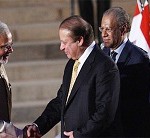In this era of global interdependence, regional cooperation is the preferred option for development. The European Union and the Association of Southeast Asian Nations (ASEAN) speak of the benefits of this approach.
The South Asian Association for Regional Cooperation (SAARC) was envisioned to be a similar success story. Cultural cohesion, and shared values and traditions, inspired the founders to believe that the association would indeed succeed. Sadly, despite nearly three decades after it was set up in 1985, real success has largely eluded SAARC.
The journey of SAARC since its inception to the present day has not been smooth. Deep-rooted mistrust and suspicion between some of the neighbouring countries for historical reasons have impeded collective progress. The SAARC process has often faltered for various reasons, leading to postponements or cancellations of summit meetings, in some cases painfully, at the last minute. This has caused frustration and disillusionment.
Given the sensitivities in bilateral relations between some of the member countries, Pakistan and India in particular, SAARC meticulously avoids cooperation on political issues. To ensure that there is no ambiguity about this, the SAARC Charter specifically states that “Cooperation shall not be a substitute for bilateral and multilateral cooperation but shall complement them’ and that “bilateral and contentious issues shall be excluded from the deliberations.” This has not, however, spared SAARC from being vulnerable to political sensitivities in the region.
Yet, despite the setbacks, SAARC has managed to survive and even grow. When Afghanistan joined the association in 2007, it enlarged the scope of regional cooperation. Countries outside South Asia, such as China, Japan, and South Korea, have either joined or applied to join, as Observer States, and this has added to SAARC’s viability and external linkages.
The 18th SAARC Summit to be held in Kathmandu next week is particularly significant. It will be an opportunity for SAARC to embark on a path of more robust engagement by initiating a change of mindset that will free the association from the shackles of suspicion and distrust. The perception that SAARC is a mechanism for member countries to countervail one another will have to be dispensed with. A climate of mutual trust and confidence must set in, together with a genuine willingness to collaborate on all areas. This must include the overarching priority to free South Asia from the vice-like grip of poverty.
Connectivity and development are interlinked, and one of the best ways to address poverty in the region. A holistic regional approach to developing the connectivity infrastructure of South Asia is indispensable to regional and national development. At the 17th Summit in 2011 in the Maldives, Prime Minister Sheikh Hasina of Bangladesh underscored the urgency of establishing such a network. The proposal was welcomed by all members, but the support and political will required to create pan-regional connectivity is still inadequate.
The restrictions on the movement of people and goods among member countries are another obstacle to SAARC’s forward movement. The absence of a unified visa regime has not allowed regional tourism to flourish. Yet another area where not much progress has been made is regional cooperation on harnessing common rivers to generate electricity. The slow implementation of the South Asian Free Trade Agreement stands in the way of trade and commerce.
All this can change by positively recalibrating the multilateral mindset and finding common ground.
For example, SAARC countries can make climate change a priority area and formulate a common approach to addressing this problem. With the rise of sea levels due to global warming, Sri Lanka, the Maldives, and the low lying deltaic areas of Bangladesh and India face the threat of inundation and the possible resultant mass displacement of people. Despite varying national priorities, the differences in approach between the least developed countries in SAARC and the other member countries must be narrowed. This will enable SAARC to adopt a common position on climate change for negotiations with the industrialised countries of the West.
Similarly, security-related concerns, another priority, can be effectively addressed under the SAARC Regional Convention on Suppression of Terrorism and its Additional Protocol. The emergence and growth of the Islamic State (IS) in West Asia, and its ruthless pursuit of terror and violence, are a grave threat to global peace and security. IS may not spare South Asia, and the 18th Summit in Kathmandu will have to take into account the gravity of the IS along with other security concerns, in order to develop adequate safeguards, including the sharing of intelligence.
While all the member countries have an equal responsibility to ensure the viability of SAARC, some hold a greater share. SAARC has more than often faltered on account of tensions between its two largest members, Pakistan and India. But bilateral issues between the two neighbours can be resolved bilaterally.
As the only member with common borders, both land and maritime, with all other members except one, India’s responsibility as a SAARC member is especially significant. India should not unduly perceive its neighbours as being envious of its growing economic and political clout. In fact, India’s prosperity will be better assured in cooperation, not in isolation.
India must become the prime mover in building SAARC cooperation, by engaging with member countries and by undertaking confidence-building measures. The commitment of India’s new prime minister, Narendra Modi, to the SAARC process, is reassuring.
The foreign minister of Nepal recently returned from SAARC capitals fully assured of the participation of all the leaders. It is hoped that there will be no last minute surprises and the 18th Summit will be held on schedule.
Ambassador Hemayet Uddin is Former High Commissioner of Bangladesh to India.
This article was exclusively written for Gateway House: Indian Council on Global Relations. You can read more exclusive content here.
For interview requests with the author, or for permission to republish, please contact outreach@gatewayhouse.in.
© Copyright 2014 Gateway House: Indian Council on Global Relations. All rights reserved. Any unauthorized copying or reproduction is strictly prohibited


